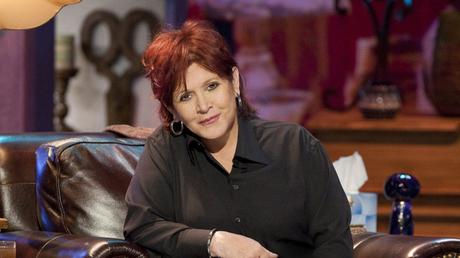
Carrie Fisher is gone, yet I feel as if I'm just now getting to know her. Last night, I binge-watched her 2010 one woman show Wishful Drinking (2010) in which she discusses her life from a stage designed like her own living room. I also watched her semi-autobiographical film and screenwriting debut Postcards From the Edge (1990) which more or less stars Meryl Streep as Fisher (just with a different name) and Shirley MacLaine as Fisher's mom Debbie Reynolds (again, with a fictional name). Plus, I somehow stumbled upon an old Lifetime special called Intimate Portraits: Debbie Reynolds & Carrie Fisher (1993).
All three have their own inherent entertainment value, although Intimate Portraits really, really shows its age (were all TV narrators in 1993 so over the top?). Wishful Drinking, adapted from Fisher's 2008 memoir of the same name, tackles her surprisingly convoluted family history as well as the high and low points of her career and personal life, but it does so in the most ingratiating way possible, leaning on Fisher's characteristic self-deprecating candor and exceedingly clever turns of phrase. Postcards From the Edge, which Fisher adapted from her own novel, feels slightly hamstrung by director Mike Nichols' own personal vision for the story. As The Washington Post argued, "Nichols is so focused on Streep almost nothing else seems to matter to him... But while Nichols is servicing his star, he lets the other areas of the film go slack."
But what do these three different sources of entertainment tell us about Carrie Fisher? That depends on how much you already know about Fisher beforehand, beyond the big stuff like Princess Leia, her being Debbie Reynolds' daughter, briefly married to Paul Simon in the 80s, struggles with addiction and second-act career as a writer and uncredited Hollywood script doctor (responsible for Hook, Sister Act, Lethal Weapon 3, The Wedding Singer, among others). Turns out, there was much more to learn:
1. Her father left her mother for Elizabeth Taylor in the breakup heard around the worldBorn to America's sweethearts Eddie Fisher (a famous singer) and Debbie Reynolds (a famous actress known for Singing in the Rain), Carrie's life was far from normal from the get-go. She jokes in Wishful Drinking that in the delivery room the doctors were so busy staring at gorgeous Debbie Reynolds and nurses so busy ogling handsome Eddie Fisher that she, as a baby, was left virtually unattended.
Eddie and Debbie were best friends with fellow Hollywood power couple Mike Todd and Elizabeth Taylor, to the point that Eddie was Best Man and Debbie Maid of Honor at their wedding. Carrie's brother Todd was even named after Mike. However, by the time Carrie was around two Mike died in a plane crash, and, as Carrie put it, "Naturally my father flew to Elizabeth's side, gradually making his way slowly to her front. He dried her eyes with his handkerchief, he consoled her with flowers and ultimately, he consoled her with his penis. This made marriage to my mother awkward. So he was gone within the week."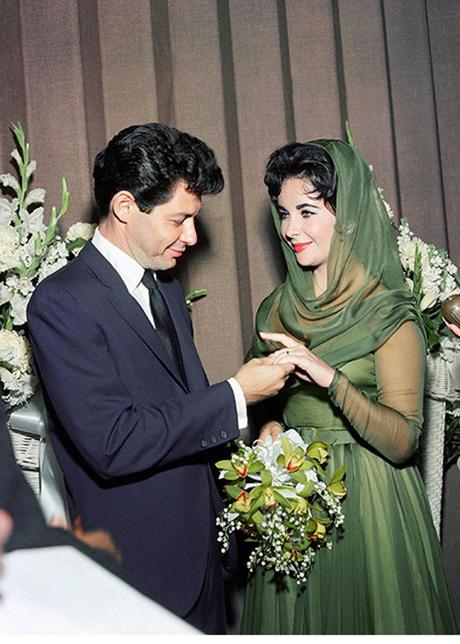
It was the Brad Pitt-Jennifer Aniston-Angelina Jolie scandal of its day. Eddie married Elizabeth shortly after divorcing poor 26-year-old Debbie, and would actually marry three more times after Elizabeth left him 6 years later for her Cleopatra co-star Richard Burton.
2. She could really singWishful Drinking opens and closes with Fisher singing "Happy Days Are Here Again" with all the oomph of a seasoned Broadway diva, yet Fisher doggedly refused to sing through almost all of her career, much to her mother's dismay.
From the time she was 11 up until her 17th birthday, Carrie performed with her mother and brother Todd on the road as part of Debbie's nightclub act. Carrie was even pulled out of high school to perform in the chorus of Debbie's 1973 Broadway musical Irene. As a result, Carrie never actually graduated from high school (about which she sarcastically deadpanned, "Chorus work is far more valuable than getting an education").
Once Carrie was 17, she had dual offers to head up her own nightclub act or accept a scholarship to attend the Central School of Speech and Drama in London. She wanted nothing to do with London, but her mother insisted, which is what ultimately led to Carrie's acting career. So, mom was right, "don't tell her that, though," Carrie liked to joke.
From that point forward, Carrie largely turned her back on singing professionally, with the occasional exception:
As Debbie explains in complete exasperation in Intimate Portraits:
[Carrie] has a great voice, an unbelievable voice that nobody's ever heard because she doesn't want to sing "like mommy and daddy." So she doesn't but it's too bad because the world should hear that wonderful voice that she has.
This real-life mother-daughter conflict carries over into Postcards From the Edge, in which MacLaine hounds Streep to consider making an album or music video as a means of diversifying her acting career. Sure enough, [spoiler alert] the film ends with Streep performing live music as the cameras roll and her adoring mother smiles approvingly in the distance.
Apparently, all those people who were stunned to hear Streep sing (and sing fairly well) in Mamma Mia! never saw Postcards.
3. Her friends thought the Star Wars title was...ah, I'll let her tell it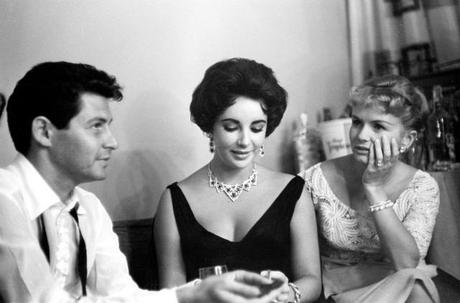
Prior to landing the role in Star Wars, Carrie had a small role in Shampoo, although the film's star and producer Warren Beatty had to first assure Debbie he'd look after her still teenaged daughter on set. One Carrie moved on to Star Wars, her friends thought the title was unintentionally amusing given her family history:
4. The doctor who pumped her stomach really did send her flowers afterwardAll of my friends made fun of me because they said the title Star Wars sounded like a fight between my original parents.
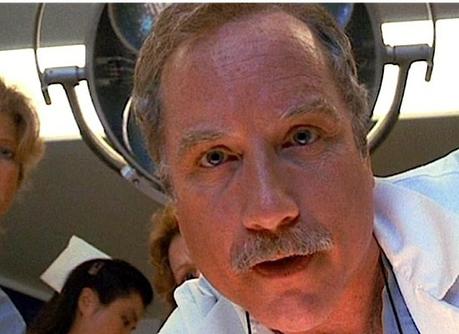
Carrie married Paul Simon when she was 26, divorced him when she was 28 and went into rehab when she was 29. Explaining her pill addiction in jest, she tells the crowd at Wishful Drinking, "You know how they say religion is the opiate of the masses? Well, I took masses of opiates religiously." She traces her addiction to the moment she hosted Saturday Night Live after Star Wars came out and instantly fell in with that crowd's hardest partiers, particularly John Belushi. Years later, when Belushi died of a cocaine overdose Carrie was stunned to learn you could actually overdose on cocaine. She thought it was simply something you did, stopped doing for a while when you went too far and then came back to later, as part of an ongoing cycle of recreational drug use.
However, Belushi's death didn't scare her into seeking help. It took almost dying from her own overdose to do that.
In rehab, she started writing her first book, Postcards From the Edge, joking she knew right away what the first line had to be: "Maybe I shouldn't have given the guy who pumped my stomach my phone number, but he'll probably never call me anyway."
That was actually based in reality. The doctor who pumped her stomach after her overdose sent her flowers afterward with a note reading, "I can tell you are a warm and sensitive person." She worked this into the Postcards From the Edge screenplay, where this bizarre exchange is ultimately acted out by Richard Dreyfuss and Meryl Streep.
5. Debbie wanted to play the mom in PostcardsCarrie was encouraged by Mike Nichols to adapt Postcards from the Edge into a screenplay with more of an emphasis on the mother-daughter relationship. Part of how Carrie went about this was to regularly call her own mother to bounce ideas off of her, asking, "If I said [insert line]to you how would you respond?" The two would improvise how that exchange might go, and it would make its way into the script.
Once the finished script was greenlit to be filmed Debbie thought it only fair that she get to play the mother since the part was based on her and she'd already contributed to the dialogue through her back-and-forth conversations with Carrie. Nichols had other ideas, though, particularly since the script turned the mother character into an alcoholic, suggesting addiction runs in the family. This was them taking dramatic license with the story. Sensing Debbie would likely disapprove of this storyline as well as various other parts of the film which are clearly told from the daughter's point of view and not the mother's, they cast Shirley MacLain instead, who is roughly the same age as Debbie, just 2 years younger.
6. Both of Carrie's step-fathers robbed her mother of all her money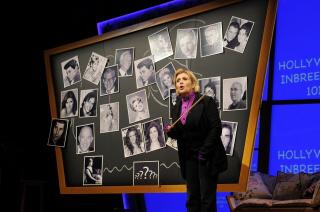
One of the more memorable moments in Wishful Drinking is what Carrie calls "Hollywood Inbreeding 101," mostly entailing her using a blackboard with a family tree on it to determine if her daughter Billie is related to Mike Todd and Elizabeth Taylor's grandson. She walks through the various pertinent marriages, including her own, and reveals some depressing facts about Debbie's second and third husbands:
Debbie does not want another man who will just run off. So, she marries a man, Harry Karl, who is very, very old and can't run. He just sits in a chair and smokes and drinks, and after about 13 years he loses all his money then he takes all her's. They got divorced, and she was alone for a while. Then fate intervened and brought her this sociopath. That's Richard Hamlet. He had money issues, too, namely her money.
Harry, who Carrie describes as "being distinguished looking, which means ugly with money," not only gambled away all of his money and Debbie's but also regularly invited prostitutes into the house and had them pretend to be stylists simply there to give him manicures. Even after Debbie became aware of all this, she was reluctant to divorce him for fear of the public shame it would bring, but was motivated to no longer be his doormat after Carrie wrote her a persuasive letter. Carrie recalled, "I remember saying that when you give it's a noble gesture, it's a good thing, but sacrifice draws on your resources and then draws on the people around you. We were all suffering [...] I saw that it was hurting her and I could not have her hurt."
Debbie divorced Karl in 1973, and remarried in 1984, staying with real estate broker Richard Hamlet until 1996. The two purchased a Las Vegas hotel together and turned it into The Debbie Reynolds Hotel, Casino and Museum. She was the performer, he the business manager, but when they divorced she was left on the hook for the huge investment they'd made in the hotel/casino/museum.
7. Her second husband left her for another manOddly, Debbie's relationship with Richard fell apart at nearly the same time as the dissolution of Carrie's second marriage, to talent agent Bryan Lourd. Bryan and Carrie married in 1991, had a daughter named Billie and divorced in 1994 when Bryan announced not only was he gay but he was leaving her for another man (who Carrie described as "the man that got the man that got away"). Billie was not yet 2-years-old when this happened, roughly the same age as Carrie when her father left her mother. This tragic coincidence was not lost on Carrie, "Whenever my mom sets out a blueprint I follow it to the 'T'."
8. She was literally the textbook definition of bipolar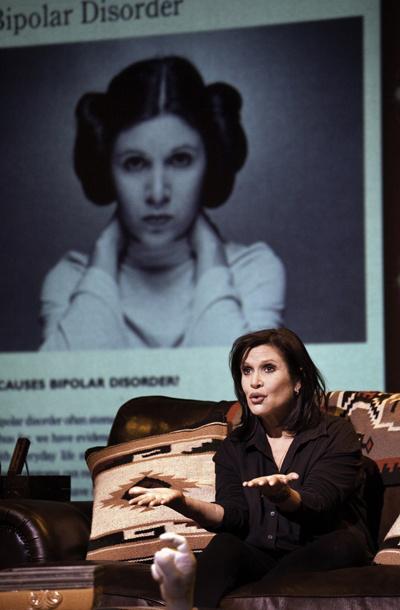
Shortly after her second husband left her, Carrie was committed to a mental hospital where she was diagnosed as manic depressive, or what we now call bipolar. She even ended up being pictured and highlighted in the abnormal psychology textbook New Hope For People with Bipolar Disorder, although no one ever asked her permission to use her image. "It's not like anyone ever phoned me and said, 'Do you have a little snapshot of yourself looking depressed or manic?'" Instead, they used the above picture from Star Wars, leading Fisher to conclude "I'm not crazy. [Pointing to picture] That bitch is! Anyone that would wear a stupid hairstyle like that has to be nuts."
There are so many other things I could list, but I'll hold back and simply encourage you to check out Wishful Drinking, Postcards or Intimate Portraits, but especially Wishful Drinking. Reading a list like this detailing some of the more scandalous aspects of Carrie Fisher's life is a poor substitute for hearing her tell the stories herself with the refreshing candor and wit which has now been robbed from us.
Carrie Fisher at the start of Wishful Drinking:
Wishful Drinking is currently available to stream on HBO Now and HBO Go. Postcards from the Edge is available on Starz. And Intimate Portraits is available on Amazon Prime.My entire life could be summed up in one phrase: If my life wasn't funny it would just be true. What that means is let's say something happens and from a certain slant maybe it's a tragic, even a bit shocking. Then time passes and you go to the funny slant and that very same thing can no longer do you any harm. So, what we're really talking about is location, location, location.

